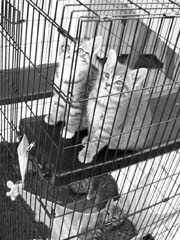The Liberty Humane Society (LHS), one of two animal shelters in Jersey City, signed a 45-year lease agreement with the city last month for the use of a building located at 235 Jersey City Blvd.
LHS was formed in 1998 when members of the Hudson County Animal League (HCAL) split off to form an animal shelter.
“HCAL was rescuing animals from the street, providing spay/neuter services, and subsidizing medical care,” said LHS President Diana Jeffrey. “LHS broke off as a group whose sole purpose was to raise funds to build an animal shelter in partnership with Jersey City.”
In 2000, LHS signed a lease for land on Route 440. When Mayor Glenn Cunningham took office, he asked the group to switch to the present location on Jersey City Boulevard.
As the city’s official animal control facility, LHS must by law take in all stray animals in Jersey City, whether they’re found by a resident or by the city’s Animal Control Department.
Until recently, the only shelter in Jersey City was the Hudson County Society for the Prevention of Cruelty to Animals (SPCA) on Johnston Avenue. Because the SPCA shelter had had many problems, the LHS wanted to build a different shelter.
According to Jeffrey, Jersey City needs 75 dog runs. The SPCA only has 20. The current LHS shelter has 31, but will expand to 75 over the next 18 months.
“There isn’t enough space for all the dogs found in Jersey City,” said Jeffrey. “Last year, there were close to 900 dogs.”
According to Stanley Rotapel, SPCA president, the SPCA has room for 50 or more dogs. The SPCA, which runs strictly on donations, does not taken in strays off the street, but gets animals from citizens. Currently, it does not euthanize animals unless a veterinarian recommends it.
Jeffrey said that the SPCA, since it is run by a private non-profit, is not under the same obligation to accept animals that the LHS is.
“The SPCA, because it doesn’t have to worry about crowding, doesn’t have to worry about the euthanasia issue the way LHS does,” said Jeffrey. “However if you bring an animal to the SPCA, there is a chance they won’t take it.”
But Rotapel said the SPCA has had room for any animal brought to them.
The SPCA was subject to an intense three-year state investigation, which published its findings in 2001. The findings included: the sale of dog food for the profit of the shelter’s manager, missing money, donating money to non-animal welfare related causes, inadequate veterinary services, poor tax reporting, not screening employees before hiring, poor recordkeeping, unsavory conditions, a Board of Trustees that acted as a rubber stamp for the then-manager.
“The reason the activists wanted to get a new shelter was because the SPCA was so inhumanely run and operated for so long,” said Jeffrey. “The state report only confirmed what had been known anecdotally.”
According to Rotapel, who has been SPCA president for two years, the present-day SPCA is functioning smoothly with a new staff, despite the challenges of being a donation-run facility.
“When I came here it was a mess,” he said. “The place was so backed up with animals there was no place to put them. But the place is cleaned up now. We don’t have 170-180 animals here, and the record keeping is all straightened out. We must have had bad employees, but most of the people here now weren’t here then, especially the board.”
New shelter
The first phase of the three-phase project for the Liberty Humane Society is to create dog runs, expanding the facility for 31 to 75 over the next 18 months.
Phase two is to create a cageless cattery where cats can roam without cages, an onsite veterinary clinic, a lobby, and a private room where people can take dogs and cats to get to know them.
Phase three includes building a parking lot, finishing the upstairs, and putting in a food preparation area and lockers for the workers.
The expansion is expected to take three years.
Pit bulls
Forty five percent of the pets that LHS gets are pit bulls, many of which are vicious. No dangerous animals are adopted out. Terminally ill animals are euthanized, but treatable animals are given medical care.
LHS relies on 35 different animal welfare organizations throughout the state to take surplus animals. There is also a network of volunteer foster homes that take animals temporarily until space becomes available.
“An aggressive adoption program has helped move through animals to be adopted,” said Jeffrey.
LHS hosts pet fairs and brings adoptable pets to community events. All animals are spayed and neutered before adoption.
Last year, the shelter received eight chickens, three roosters, 10 rabbits, a peacock, plus a number of ducks, guinea pigs and turtles.
The city-run shelter is funded through a combination of city funds, the sale of dog licenses and private donations. Presently, cats do not need licenses.
For more information about the LHS, call (201) 547-4147. For more information about the SPCA, call (201) 435-3557.
